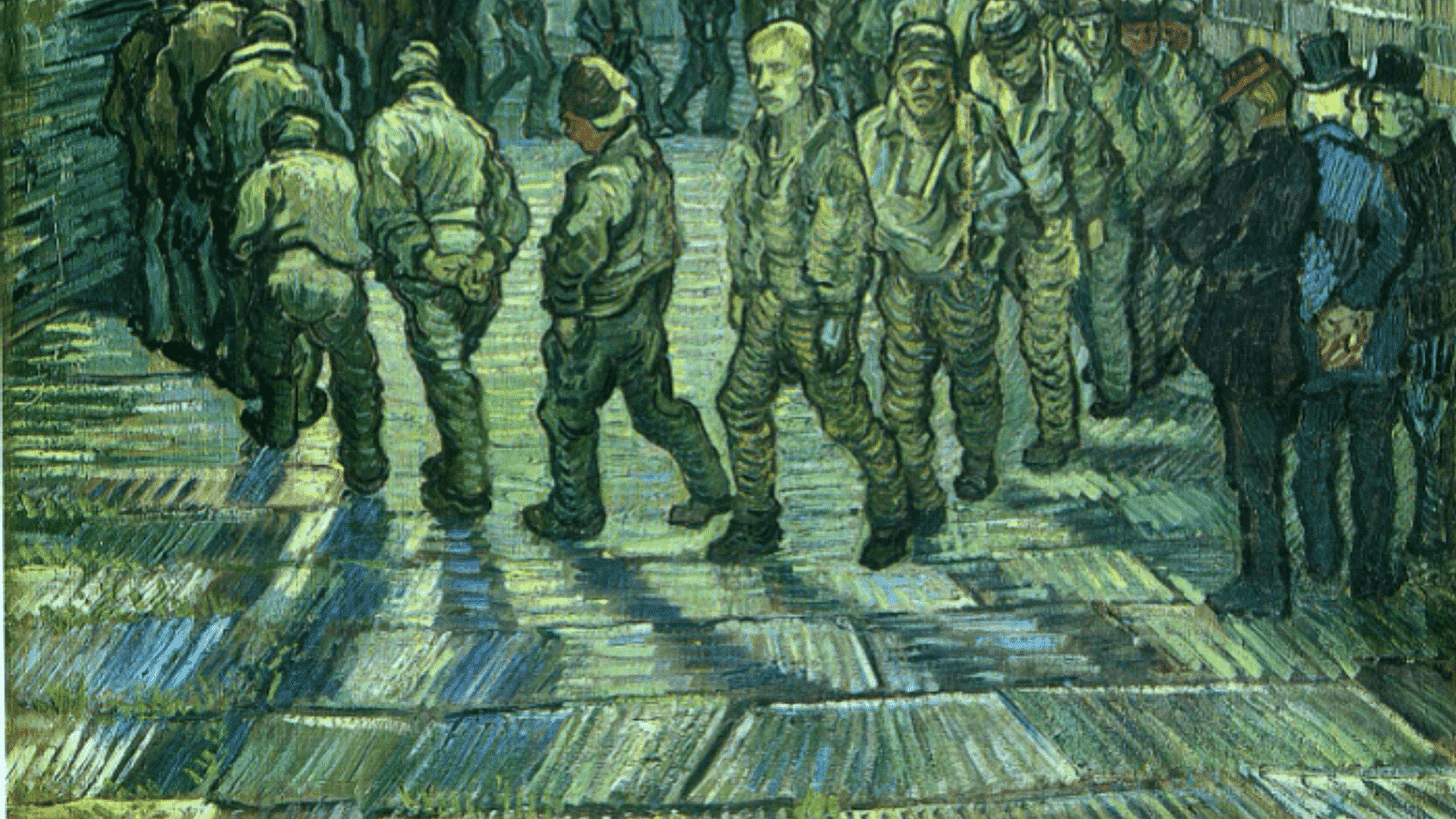The game is played in a circle. The first player whispers a few words into their neighbors’ ear, who then passes the message down to their neighbor, who does the same, and so on until the gamut is run and we are back at the beginning. The last player stands up and recites the final reiteration of the message, then the original words are given by the first player. Along the way, the message has changed completely, sometimes in a very amusing way.
Chinese whispers is of uncertain origin and date. There are references to it being played in England in 1873, where it was called Russian scandal. The OED gives a much later example from 1964, the height of the Cold War. I have also heard it was played in Medici-era Italy but have been unable to find any real citation. As a humorous game of verbal distortions, it could have been invented at any time and any place. Perhaps it is older than the cave paintings at Lascaux.
Italian kids call it fiabe russe, Russian fib or tale. For the French it is le téléphone arabe, reflecting their colonial snobbery. The Germans refer to it as Stille Post, quiet mail, which is the eeriest of names. The Turks are dead literal: kulaktan kulağa, ‘from one ear to another.’ Poles call it głuchy telefon, deaf telephone, which sounds like a play by Witkacy. Other names for it in England and the US are suitably conspiratorial: Whisper down the lane, Rumors, Operator, and the Messenger game. Wireless telephone anticipates the internet; some of us remember playing Broken telephone or Grapevine. The game remains particularly popular in Greece, Malaysia, New Zealand, and Finland.
To nervous empires, the languages of Chinese, Slavs, Semites, Indians, and Celts are garbled and crude yet also cunning and duplicitous. They are full of passwords and initiations, hidden insults and epithets, the dark cyphers of Mafias and Druids and Tongs. By penetrating these languages, it was thought, you might penetrate their world. But their world proved very seductive, both in the flesh and in the sensual imperial gaze. No one is immune from dirty talk. The more you hear, the more you want. As proof of this paranoia, consider the US State Department. They fired all their Arabists during the Gulf Wars and recently did the same with Russophones, dismissing them precisely for the very reason they were sought out in the first place—knowledge of Arabic or Russian. State is now advised by ‘experts’ who are incapable of understanding a single word of their adversaries [i] but whose loyalty is assured by their total lack of ability and curiosity. Translation is slippery. We hold our tongues.
James Joyce was a great admirer of Chinese whispers, played it at parties, and used it in his comic masterpiece, Finnegans Wake. In his book, garbled words create a dialectical meaning by picking up associations from the fragments and roots of real words in many different languages. The overtone catches associations, homophones already linked through sound that wait for human speech to tie them together. Sometimes what we think we hear conveys a deeper meaning than so-called sensible language. Perhaps loan words are passed from language to language in this way. Everybody laughs and the word is accepted and given life and all living pleases. We speak and mix, distort and pun, drift and slide, unbridle and take and malapropose— miscegenations on miscegenations.
The project of Finnegans Wake was to pollute the language of the oppressor (remember that its author was Black Irish). That is why we are told not to read it, that we won’t understand it—never to listen. Like Chinese whispers, these cryptic sounds will corrupt the language we receive and scramble its proper order.
By the time the message has gone full circle, things have been added and subtracted, substituted and transformed. Stars and Stripes becomes starves on tripe. Even a single misheard letter can shift the entire meaning of the original message (stop or slop), or a word (maybe or rabies). And there can be as many rounds of the game as the players want (the first player simply repeats what he hears from the last and passes it around again until he decides to finally call it). In the end, Chinese whispers is a pure game because it does not involve competition. It consists wholly of moves, and it moves like a river.
The movable type of Gutenberg’s press constructed sentences in straight lines, each word following the next in a lateral procession on the press stone [ii]. This militarized front of text bares down, relentlessly forging ahead, making a forward assault on the captive reader and pushing the eye along its rows with the force of a bayonet. The machine spits out a payload of massive identical volumes, reems and triremes of knowledge and propaganda and confession and apology, galleys of severe lines advancing ever onward yet never meeting. Blank space on the page is terrain to be occupied. Empty space is enemy space.
The squared-off page and its lateral type regiment stand in contrast with the figure of the circle. A circle returns to the beginning, no matter how wide its circumference. A true circle curves at every point; its diameter can never be accurately measured because its width is never an ideal straight line. Gutenberg’s printing press annexes thoughts in martial fields, forcing them into regulated succession (syntax). But human thought is circular and spiral, returning erratically to a beginning that is no longer a beginning and an end that ends over and over (fin-again). Sentences are arrangements of symbolic sets, stiff as stone, dense and unyielding. Speaking and song wake these rigid points from their paginated deathsleep. Until then, nothing breathes between the covers; words make no impression beyond the shallow depth of dull copy. The printed page is a plane of limitations that can never be overcome. Clever maneuvers count for little in the end. Typeset cannot place an echo around a word. Rendering words simultaneously would just make a blotch on the page. Columns can only be scanned one at a time, so the desired effect of reading parallel events never goes beyond layout. We turn the leaves and count them off. Then we close the book.
Players of Chinese whispers can be compared to exiles on a desert island. Their task is to carry a few words in time and space using the most primitive tools (ear and mouth), without recourse to recording technology. As the phrase travels the loop of players, it gets one step closer to the one who coined it yet more distant in meaning. Fidelity to the original is lost precisely because each player thinks he retains it and passes it on in its purity to the next. The players are prisoners of the game, of desperate transmission and interpretation, trying to finish what someone else has said and keep the secret until it is redeemed. A few words in a fragile mouth, from one lifer to the next, passed on a way a lone a last a loved a long. Like a plea for clemency arriving too late to be submitted to the court, the message becomes the last words of the condemned, a defiant reply before the authentic sentence is carried out.
Finnegans Wake was finally translated into Chinese by Dai Congrong in 2010. It quickly sold out its first print run and climbed to Number Two on the prestigious Shanghai bestseller list.
[i] In contrast, the evil Chinese mastermind of Sax Rohmer’s racist Fu Manchu novels holds doctorates from Heidelberg University, the Sorbonne, and the University of Edinburgh. In the 1935 film Mask of Fu Manchu, with Karloff as the insidious villain, he states proudly that "I am a doctor of philosophy from Edinburgh, a doctor of law from Christ's College, a doctor of medicine from Harvard. My friends, out of courtesy, call me 'Doctor'".
Having little formal education, Ho Chi Minh spoke fluent English, French, German, Russian, Italian, Mandarin and Cantonese (and wrote poetry in three of them). That is seven more languages than LBJ, Robert McNamara or General Westmoreland had.
[ii] Chinese and Korean movable type predates Gutenberg’s 1440 innovation by several hundred years, a block printing method which allowed for multiple copies to be made quickly.








Man this is great. Is that true about Finnegan’s Wake going Chinese-publishing viral? If so, what confounding factors are in play, and did its appearance at no. 2 by any chance inspire this piece? Also: I’m pretty sure it is “starves on tripe.”
Fascinating! I did read a China Miéville novel (Embassytown, which is wonderful) wherein simultaneously spoken sounds (from different mouths) were rendered in a kind of fraction format (the kind with the numerator and denominator above and below a horizontal line); the audiobook, which was equally wonderful, used multitracking so that the sounds would be voiced simultaneously, which was a spooky and effective device, I thought.
As for the game, everyone I knew as a child (St. Louis, 1970s) called it Telephone.